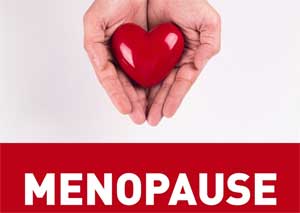- Home
- Editorial
- News
- Practice Guidelines
- Anesthesiology Guidelines
- Cancer Guidelines
- Cardiac Sciences Guidelines
- Critical Care Guidelines
- Dentistry Guidelines
- Dermatology Guidelines
- Diabetes and Endo Guidelines
- Diagnostics Guidelines
- ENT Guidelines
- Featured Practice Guidelines
- Gastroenterology Guidelines
- Geriatrics Guidelines
- Medicine Guidelines
- Nephrology Guidelines
- Neurosciences Guidelines
- Obs and Gynae Guidelines
- Ophthalmology Guidelines
- Orthopaedics Guidelines
- Paediatrics Guidelines
- Psychiatry Guidelines
- Pulmonology Guidelines
- Radiology Guidelines
- Surgery Guidelines
- Urology Guidelines
Heart attack could lead to early menopause, finds study

Women who experience a stroke, heart attack or some other type of cardiovascular event before age 35 are at twice the risk of going into early menopause that could result in its own set of health hazards, according to a new study to be presented at the American Stroke Association's International Stroke Conference in Honolulu.
Menopause is the permanent cessation of menstrual cycles in women, that occurs around age 51.
Past studies have established a link between women having early menopause and an increased risk of cardiovascular disease (CVD).
Past studies have found a link between early menopause and an increased risk of cardiovascular disease. But a group of researchers in Australia set out to see whether the reverse is true: Could a stroke, heart attack or other cardiovascular event in young women contribute to early menopause?
In this new research, the scientists presented data on 177,131 women pooled from nine studies. The women were categorized according to an age they went into menopause, classifying anyone who started before age 45 as "early." They also looked at their self-reported cardiovascular events, such as heart attack, angina, and stroke.
Key Findings:
- Women who had a cardiovascular event before age 35 had twice the risk of being in menopause by the time they reached 45.
- Women who had an event after 40 were more likely to experience "normal" menopause at around 51.
The findings should send a strong message to doctors of young women with heart disease, said the study's lead author, Dongshan Zhu, a doctoral candidate at the University of Queensland in Australia.
"These women should be alerted by their physicians for their future high possibility of having early menopause because early menopause is associated with higher risk of death, Type 2 diabetes, and osteoporosis," he said.
Zhu said that because most of the women in the study were white, more research is needed to see whether the findings hold firm in other races and ethnic groups.
Additional studies also could examine whether genetic factors tie early-onset menopause to the occurrence of cardiovascular disease, he said, or whether environmental factors such as smoking also play a role.

Disclaimer: This site is primarily intended for healthcare professionals. Any content/information on this website does not replace the advice of medical and/or health professionals and should not be construed as medical/diagnostic advice/endorsement or prescription. Use of this site is subject to our terms of use, privacy policy, advertisement policy. © 2020 Minerva Medical Treatment Pvt Ltd